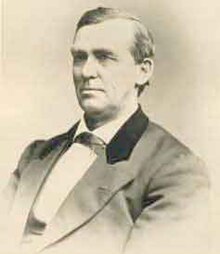- 1 2 3 4 5 6 7 8 9 10 "Durham, Milton J." Biographical Directory of the United States Congress
- 1 2 3 4 5 6 7 8 Biographical Cyclopedia, p. 4
- 1 2 3 4 Biographical Cyclopedia, p. 5
- 1 2 3 4 5 Barnes, p. 67
- ↑ Tapp and Klotter, p. 123
- 1 2 3 Barnes, p. 68
- ↑ McAfee, p. 158
- 1 2 3 McAfee, p. 120
- ↑ "Interesting Triangular Fight in 'Old Eighth'. The Interior Journal
- 1 2 3 4 5 "Kentucky's Angry Governor". The New York Times
- ↑ "All Met to Condemn Breckinridge". The New York Times
- ↑ "Political Riot in Kentucky". The New York Times'
- 1 2 "Encounter in a Newspaper Office". The New York Times
Bibliography
- "All Met to Condemn Breckinridge" (PDF). The New York Times . 1894-05-15. Retrieved 2011-05-31.
- Barnes, William Horatio (1874). The American Government: Biographies of members of the House of representatives of the Forty-third Congress. Vol. 3. New York City, New York: Nelson and Phillips.
- Biographical Cyclopedia of the Commonwealth of Kentucky. Chicago, Illinois: J.M. Gresham Company. 1896.
- United States Congress. "Milton J. Durham (id: D000572)". Biographical Directory of the United States Congress .
- "Encounter in a Newspaper Office" (PDF). The New York Times . 1896-05-17. Retrieved 2011-05-31.
- "Interesting Triangular Fight in "Old Eighth"". The Interior Journal. 1916-12-12. Retrieved 2011-05-31.
- "Kentucky's Angry Governor" (PDF). The New York Times . 1886-05-29. Retrieved 2011-05-31.
- McAfee, John J. (1886). Kentucky politicians: sketches of representative Corncrackers and other miscellany. Louisville, Kentucky: Press of the Courier-Journal job printing company. Archived from the original on 2005-03-08. Retrieved 2011-05-31.
- "Political Riot in Kentucky" (PDF). The New York Times . 1896-11-01. Retrieved 2011-05-31.
- Tapp, Hambleton; James C. Klotter (1977). Kentucky: decades of discord, 1865–1900. Lexington, Kentucky: University Press of Kentucky. ISBN 0-916968-05-7 . Retrieved 2009-06-26.
Milton J. Durham | |
|---|---|
 | |
| First Comptroller of the Treasury | |
| In office March 20, 1885 –April 22, 1889 |